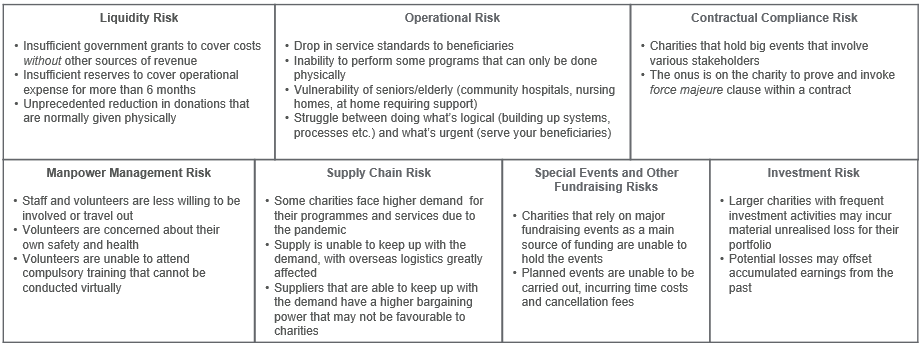As the COVID-19 pandemic has changed the way we do business today, charities have to be agile in adapting to this new approach. Charities must also build financial resilience to tide over this critical period and be prepared for a post COVID-19 world.
- What the online poll revealed
Based on the results of an online poll conducted prior to the webinar, charities are expecting to see a decrease in donations and majority of them are reviewing their fund-raising programmes, prioritising those that have the greatest impact on their beneficiaries. The polling result also shows that 77.8 per cent of the respondents have included online channels in their charity drives to reach out to donors and beneficiaries. Details of these findings were further discussed by RSM’s partners, Tay Woon Teck and Dennis Lee, during the Q&A session.
- Manage cost and streams of revenue
The Commissioner of Charities, Dr Ang Hak Seng, in his opening address, advised charities to make necessary changes and calibrate their business models to survive this trying period and emerge stronger. He defined and elaborated the key components of financial resilience as “Cost” and “Revenue” that charities should consider when managing their finances:
- Cost:
- Economy of scale: Continue to do what you do best, outsource the rest
- Economy of scope: Foster strategic alliance through collaborations with other organisations and charities
- Revenue:
- Private: Be innovative with your fundraising drives by adopting technology
- Public: Tap into government grants that are made available during this period
- Risks that are relevant to charities
Woo E-Sah, Partner and Industry Lead of NPO Practice, succinctly addressed the various kinds of risk that charities may be facing:

These risks are real and they can potentially cripple an organisation if not appropriately addressed.
- What charities can do now
Performing an organisation health check is what charities can and should do to stand in good stead:
- Understand one’s cash flow by performing a cash forecast
- Assess revenue streams and damages, such as performing revenue projections based on updated budgets
- Manage service level disruption, such as significant disruptions in medical and other supplies, and the lack of volunteers
- Address both the impact and financial bottom lines by rating the impact of all programmes, and funding those that suffered the greatest impact first
- Involve all stakeholders when developing potential solutions
- Ensure all health and safety advisories affecting operations and employees are strictly adhered, and update SOPs and BCPs for strict compliance
- Review, with the approved fund managers, the performance of one’s investment portfolio
- Closing the loop
In closing, E-Sah reinforced the following points that charities can do to keep them afloat during this period:
- Assess whether the current reserve and cash flows are able to sustain during this period
- Prioritise programmes that have the greatest impact on the beneficiaries using the Pareto Principle
- Ensure availability of staff and volunteers for operation support
- Implement precautionary measures to maintain health and safety of staff and volunteers
- Evaluate whether there are untapped opportunities/resources that can be used after the pandemic is contained
Charities that need assistance to build financial resilience or would like to receive a complimentary copy of “Survival Toolkit Evaluation Checklist and Cash Projection” may reach out to:
Woo E-Sah
Partner & Head of Assurance
T +65 6594 7843
[email protected]
Sovann Giang
Senior Director & Deputy Industry Lead, Not-for-Profit Practice
T +65 6594 7892
[email protected]
The “Charities Resilience Survival Toolkit Webinar”, jointly organised by RSM and the Ministry of Culture, Community & Youth, was held on 8 May 2020. View the recording on RSM Singapore YouTube channel at https://www.youtube.com/watch?v=Mt1RM56JkV0.

